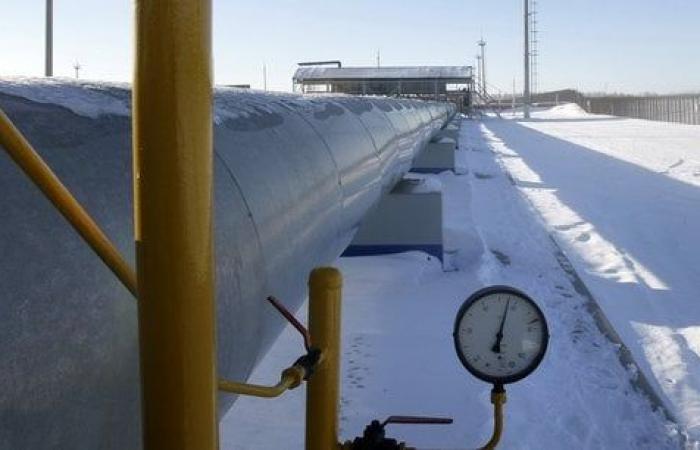War does not prevent trade, far from it. As absurd as it may seem, despite the Russian invasion of Ukraine in February 2022, kyiv and Moscow remain linked by a major gas transit contract. Renewed in 2019, this allows Russia to propel the precious molecule into a gas pipeline crossing Ukraine to transport it and sell it on the Old Continent. This gas route now represents only 5% of the European Union's gas imports, but remains strategic for three Member States: Austria, Hungary and, above all, Slovakia, including 65% of gas demand. gas, in 2023, was satisfied with this route.
This strange trading – which is completely legal since the EU has not imposed sanctions against Russian gas imports – should however stop in less than a month. While the contract linking kyiv and Moscow ends on December 31, 2024, Ukrainian President Volodymyr Zelensky has repeatedly repeated his wish not to renew it, unlike the Putin regime.
Gas: why Brussels wants to sanction the transit of Russian LNG in European ports
Billions of dollars at stake
And this, even if this contract brought Ukraine 800 million dollars in revenue from transit rights paid by the Russian giant Gazprom in 2023, or 0.5% of its GDP according to data collected by the Belgian think tank. Bruegel. Because, opposite, this same pipeline allows the Kremlin to generate around 540 million dollars in revenue from the sale of gas, each month! That’s $6.5 billion per year. A precious windfall to finance the war investments of Vladimir Putin's regime, whose financial needs are growing while Russia flirts with hyperinflation.
In theory, the shortfall on the Russian side should therefore be much greater. “But Russia will probably not deprive itself of all these revenuespoints out Jacques Percebois, economist specializing in energy. It will undoubtedly export more liquefied natural gas (LNG) [qu’elle pourra acheminer par voie maritime alors que l’Europe s’est dotée de nouveaux terminaux de regazéification, ndlr] and will increase the volume of gas it currently passes through the pipeline that crosses Turkey, Turkstream, he explains. The only other gas pipeline in service allowing the molecule to be transported to the Old Continent.
A sleight of hand with Azerbaijan
Above all, Russia should count on Azerbaijan to continue selling its gas. Indeed, several Slovak and Hungarian energy companies, whose governments are close to the Kremlin, are studying the possibility of accessing Azerbaijani gas. Last month, the Slovak company SPP signed a pilot contract with Baku to transport gas through Turkey. Which could lead to “significant contracts”Vladimír Šimoňák, Slovak Deputy Minister of Economy, recently declared at the Financial Times.
However, this trade agreement will in reality be nothing more than a sleight of hand. Such ” exchange ” would simply result in the continuation of Russian flows, but in “pre-labeling” as being Azerbaijani, recently alerted Kadri Simson, the outgoing European Commissioner for Energy, in the same British daily. Very concretely, “Baku would buy from Russia the equivalent of what European countries would buy from it, because Azerbaijan does not have sufficient production capacity to cover this additional demand”explains Ines Bouacida, researcher at Iddri specializing in energy transition in France and Europe. “This would amount to laundering Russian gas,” summarizes Jacques Percebois.
Europe still dependent on Russian gas
Asked about the possibility that Azerbaijan would end up re-exporting Russian gas rather than delivering its own production, Slovak Minister Vladimír Šimoňák acknowledged that it would be virtually impossible for the EU to control this situation. The Twenty-Seven would therefore maintain their dependence on Russian gas even though they have set themselves the objective of no longer obtaining their supplies from Russia by 2027.
The EU still dependent on Russia
“We cannot exclude that the contract between kyiv and Moscow will ultimately be renewed at the last minute, warns, for his part, Phuc Vinh Nguyen, director of the energy center of the Jacques Delors institute. This is exactly what happened at the last renewal”he recalls.
Such a scenario would delight Slovakia and Hungary, which are pleading for continued supply via the Ukrainian gas pipeline. Stopping gas transit through Ukraine would not jeopardize their security of supply this winter (in particular due to the high levels of storage and the alternatives allowed by LNG), but would penalize them economically while this land route ensures them a very cheap gas supply.
“Slovakia and Hungary will threaten to use their veto power within the European Union on votes relating to aid to Ukraine in order to obtain greater support for the maintenance of this contract”warns Place Publique MEP Thomas Pellerin Carlin, specialist in energy issues.
The elected official protests against political decisions slowing down the deployment of renewable energies, heat pumps and electric vehicles, “which would make it possible to curb our dependence on fossil fuels, which finances countries hostile to our values and our strategic interests and our security”. “Today, the financial, humanitarian and military aid provided to Ukraine by the European Union amounts to 120 billion euros while the energy bill paid to Russia since the 2022 invasion amounts to 200 billion euros, according to CREA data »recalls Ines Bouacida.






